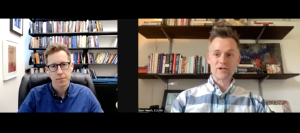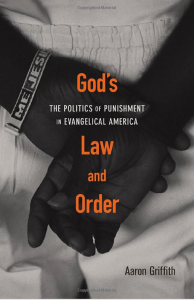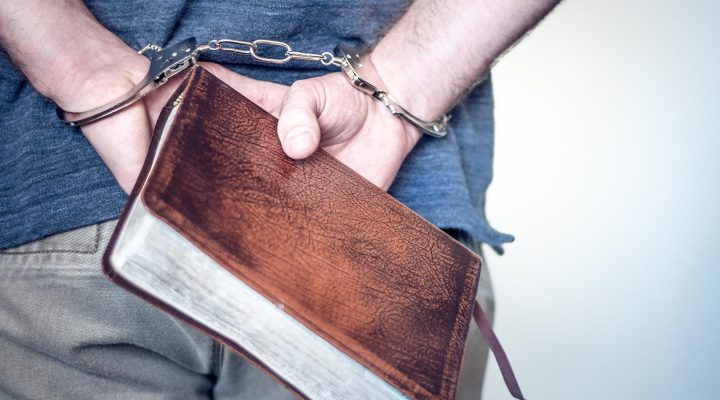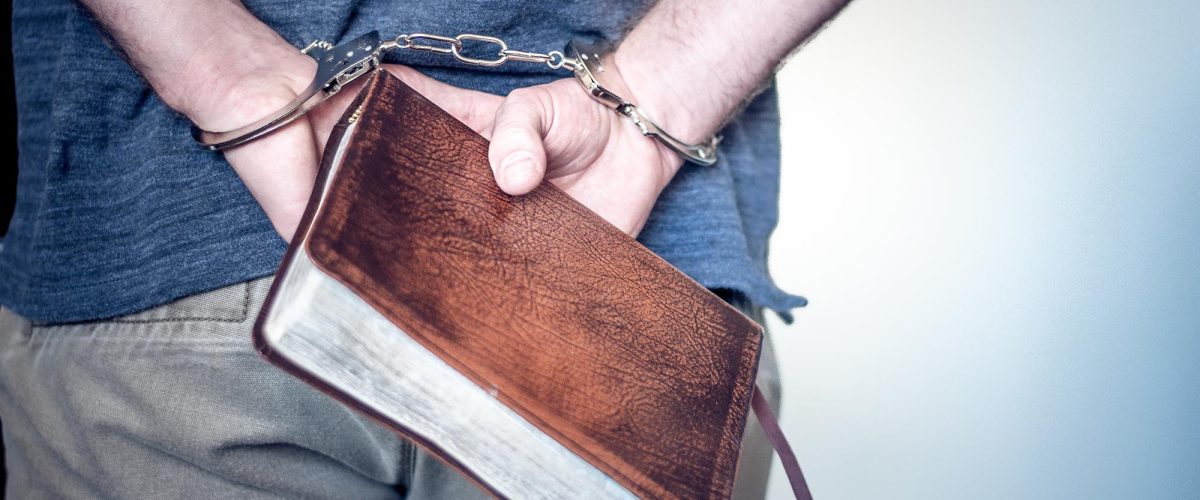It’s hardly surprising that evangelicals have a passion for jail and prison ministries in order to bring comfort and conversion to the incarcerated, historian Aaron Griffith noted during a recent webinar hosted by the Equal Justice USA Evangelical Network.
But the intriguing part is that most evangelicals also are enthusiastic proponents of get-tough-on-crime politicians and policies that disproportionately target minorities and the poor, said Griffith, author of God’s Law and Order: The Politics of Punishment in Evangelical America, and an assistant professor of modern American history at Whitworth University in Spokane, Wash.
Griffith explained to webinar moderator and network manager Sam Heath that his firsthand exposure to evangelical attitudes around prisoners and prisons came while participating in church and prison ministries as a master’s and doctoral student at Duke University Divinity School.
“I was seeing evangelical Christians who were so passionate about going into prisons and being in fellowship and being present with incarcerated people. If you go into a prison, you will often see the influence of evangelical Christians throughout, whether that’s in the lives of incarcerated people or the ministries and programs that are there. And I was very moved by this, and I still am,” he said.
“If you go into a prison, you will often see the influence of evangelical Christians throughout.”
“But I was seeing, at the same time, that these same churches were also supportive of law-and-order politics or were embracing law-and-order politicians and were supportive of capital punishment. They were interested in public safety in ways that were so clearly impacting racial minorities and poor people, and I was just disturbed by that and wondering, How do these two features of American evangelical life co-exist?”
Griffith said he found the answer, at least partially, in the early 20th century. That was a time when Christians increasingly were aware and concerned about rising crime rates due in part to prohibition and mushrooming urbanization. “There was a growing sense that America was a lawless place that needed reform.”

Griffith and Heath
So it was that many Christian groups, both conservative and liberal, threw their support behind the concurrent rise of police departments, the creation of the FBI and new and expanded criminal codes, Griffith said.
“Christians became a key public voice in speaking out to their congregants, and in periodicals and publications, to say, ‘These are good things. We have to do something about the crime problem, and we have to support these new organizations and governmental state structures designed to address crime in some way.’”
But that is where fundamentalist and progressive Christians parted ways, he added.
“For liberals, that looks more like, ‘Let’s invest in the scientific methods of criminology and these new penological forms that are emerging.’ With conservatives it tended to be more law-and-order focused — ‘Let’s just punish people. Harsher sentences. Use the death penalty.’ But the general shared sense is that crime is a problem. It’s a religious issue. It’s evidence of sin in our society and that we have to do something about it and that the state has something to do with that response.”
“J. Edgar Hoover, then head of the FBI, wrote columns for Christianity Today magazine after its launch in the 1950s.”
And government leaders were paying attention to voices like Billy Graham, who made crime and juvenile delinquency a central theme of his groundbreaking 1949 Los Angeles crusade and in subsequent revivals. His and other religious voices influenced the hardening crime policies across the nation through the 1970s. And J. Edgar Hoover, then head of the FBI, wrote columns for Christianity Today magazine after its launch in the 1950s because he understood that engaging conservative Christians mattered in policing and policy making, Griffith said.
“It’s not as if evangelicals were the only ones, but they were setting the terms for the debate. And as they grew in influence and size, they really shaped the conversation and I think bear a lot of responsibility for why things are the way they are today.”
 Theology motivates evangelical beliefs and actions around crime and blocks them from grasping the contradiction between loving prisoners and supporting more prisons, he said. “For evangelicals, the people who are inside of prisons are sinners, and that kind of assumption gives a kind of divine authority, a divine sanction, to the fact that these kinds of prisons exist and that they house a lot of people. And it helps evangelicals become blind to the inequities in the system.”
Theology motivates evangelical beliefs and actions around crime and blocks them from grasping the contradiction between loving prisoners and supporting more prisons, he said. “For evangelicals, the people who are inside of prisons are sinners, and that kind of assumption gives a kind of divine authority, a divine sanction, to the fact that these kinds of prisons exist and that they house a lot of people. And it helps evangelicals become blind to the inequities in the system.”
It also helps them rationalize the racial disparities in the U.S. prison system, Griffith added. “The sin equation becomes a very convenient way to dismiss that and simply say, ‘Well, maybe there are racial disparities in prions, but they’ve committed crimes. They’re sinners. I guess they should be there.’ That overwhelms for evangelicals any kind of careful analysis or understanding of the inequities and how law enforcement actually works and how the prison system actually works in this country.”
The “sin-crime equation” provides the motivation for prison ministry and the desire to share Christ, to mentor and to fellowship with the incarcerated, he said. But it also grants a kind of biblical sanction to overcrowding conditions and economic disparities.
“Prison becomes an asset for conversion. Punishment becomes an inducement to think about eternal matters. I think evangelicals say this about the death penalty, that it forces someone who is about to be executed to think about where their soul is going to be, and so maybe it’s not so bad.”
Another factor is the evangelical adoration of Romans 13, which is interpreted as blanket approval of American policing methods and incarceration, however harsh.
“For evangelicals, this translates into their understanding of policing and punishment in a way that, in their minds, respects this divine order that God has set up.”
Related articles:
How second-chance hiring works for business | Opinion by Jeffrey Korzenik
As U.S. holds world record for imprisonment, churches increase prison ministries


